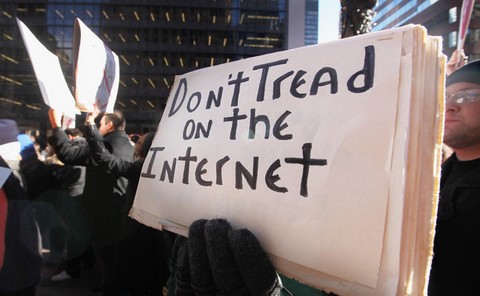When Wikipedia went dark and Google blacked out its logo on Wednesday, millions of people could not help but notice. For most, it was the first time that they had heard about two antipiracy bills. One puzzled Twitter user wrote: “Isn’t a SOPA some kind of food?”

But that protest grew out of a much wider grass-roots movement — a collective flexing of Internet musclethat started in some of the less mainstream parts of the Web, like the social news site Reddit and the blogging service Tumblr, and in e-mail chains and countless message boards.
It is no coincidence that these social sites were among those that, according to critics of the legislation in question, the Stop Online Piracy Act, and the Protect Intellectual Property Act had the most to lose if it passed. And by design they were able to take the message about the threat and make it go viral.
In the resulting groundswell, lawmaker after lawmaker renounced support for the legislation. Fight for the Future, a nonprofit organization that helped organize the protests, said more than 115,000 Web sites participated, and three million people e-mailed Congress to voice their opposition to the bills. “The tech community is using its own technology to rally around the issue,” said Ron Conway, a Silicon Valley patriarch who has invested in hundreds of start-ups, and runs SV Angel, an investment fund. “We probably wouldn’t prevail here if we weren’t eating our own dog food.”
Supporters of the bills, which include major media and entertainment companies, say their only intention is to go after foreign Web sites that distribute unauthorized copies of software, videos and music. But the tech industry maintains that the language in the bills is too broad, and that they could pose a threat to free speech and stifle innovation. Among other things, they say, the bills could make sites responsible for all content or links posted by their users, a weighty burden for social sites.
Many in the industry say the legislation began to stir suspicion as early as September, with respected venture capitalists like Fred Wilson and Paul Graham calling attention to it in e-mails and on the Web.
But the cause gained visibility on Nov. 16 when Tumblr added a feature that “censored” the dashboard users see when they log into the site, and pointed them to information about the bills.
The idea for the feature came out of a three-hour meeting the weekend before, organized by people who opposed the legislation, including members of Fight for the Future; Brad Burnham, a partner at Union Square Ventures; and David Segal, executive director for Demand Progress, a non-profit group.
John Maloney, the president of Tumblr, said the company volunteered its offices in Manhattan for the meeting, which included roughly 40 people in the room and another 40 or so on speakerphone. Employees of well-known sites like Kickstarter and Reddit were there.
“They told us why it was flawed and asked us to think about it as an industry and a group,” said Mr. Maloney, who added that David Karp, Tumblr’s founder, “was very quick to raise his hand and say ‘We’re in.’ ”
“I looked at David and he had a spark in his eye,” Mr. Maloney said.
Mr. Maloney said a team of people at Tumblr worked late into that evening and returned early on Sunday. That Wednesday morning they posted their work, sat back and watched it come to life and spread around the Web.
Tumblr plays host to 40 million blogs, including the official blogs of start-ups and the personal sites of many tech types, and the alert caught their eye.
“For Tumblr, a New York company with a very solid reputation, to take such a vocal stance on an issue woke people up,” said Nate Westheimer, executive director of the New York Tech Meetup, which organized a rally in Manhattan on Wednesday to protest the bills.
Mr. Westheimer said Tumblr’s alert was the first he had heard of SOPA, and it was enough to prompt him to collaborate on the protest, which attracted close to a thousand people. He said Reddit played an equally important role in feeding the dissent.
Reddit, a site where users share links and chat about tech topics, funny photos and everything else, became a hive of organizational activity in November.
A link to a petition about the Stop Online Privacy Act surfaced on a Reddit discussion board and caught the attention of James Maw, a 20-year-old living in Yorkshire, England, who provides tech support for a bank. On Nov. 16 he created a separate forum on Reddit dedicated to discussion of the legislation.
“It was not at all well known then,” he said. The chatter on that board started out as a trickle before turning into a flood, and it attracted 2.5 million visitors a day at its peak.
“You wouldn’t think that a piece of U.S. legislation would affect people outside of the United States,” Mr. Maw said. “But I use Reddit and that could be affected by this.”
Reddit members began rooting out supporters of SOPA, zeroing in on Go Daddy, the domain name seller, and urging its customers to take their business elsewhere. The response was so great that Go Daddy rescinded its support of the bill. Reddit was also one of the first sites to commit to a protest shutdown.
Clay Shirky, a scholar of Internet culture who teaches at New York University’s Interactive Telecommunications Program, said that unlike other protests that are inflection points for a society, the SOPA-related outcry didn’t have one turning point when a switch flipped in the public consciousness. Instead, he said, it was a 21st-century version of a phone tree.
“It pervaded people’s consciousness more and more as time went on,” Mr. Shirky said. It wasn’t long, he said, before “a disorganized group of people online became a coordinated group of people taking action.”
Twitter played a role in keeping the momentum moving — particularly since there was little coverage of the bills in major media outlets until recently. There were nearly 200,000 Twitter posts mentioning SOPA on Monday, more than 450,000 on Tuesday and about 3.9 million on Wednesday.
And although the decision by Wikipedia and Google to join the protest was instrumental in drawing attention to the dissent, they “did not lead this effort,” Mr. Shirky said. “They followed it.”
Supporters of the legislation say that the response to it has been overblown. Representative Lamar Smith, the Texas Republican who drafted SOPA, said its opponents were spreading “fear rather than fact.”
But those who helped mobilize the protests disagree.
“The real question is, ‘Are they overreacting to the scale of the problem?’ ” said Mr. Burnham of Union Square Ventures.



